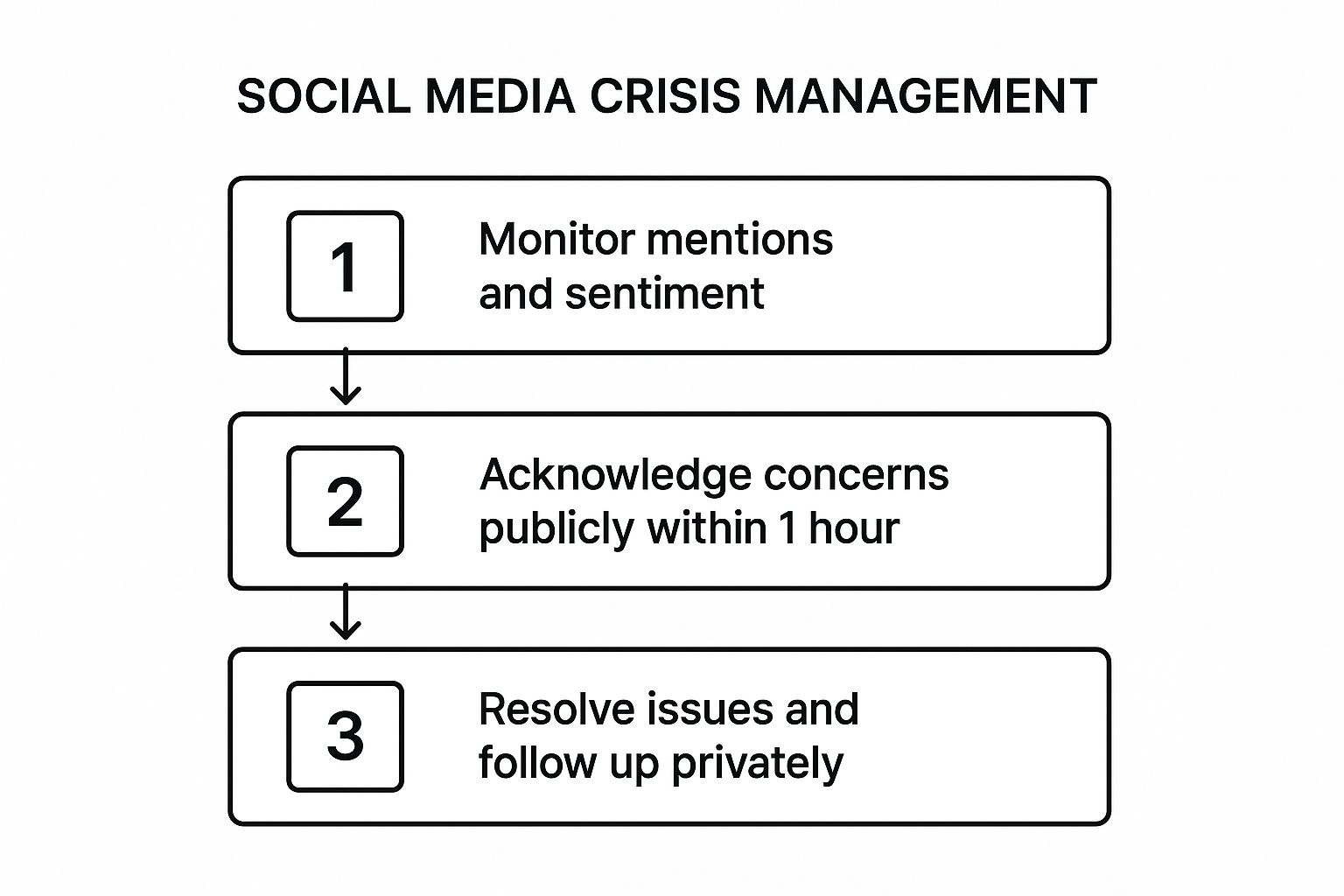
Top Interview Questions for Social Media Manager in 2025
Published
Hiring Your Next Social Media Star: The Questions That Matter
Finding a truly exceptional social media manager is more than just scanning a resume for platform logos and buzzwords. It requires identifying a unique blend of creativity, analytical prowess, strategic foresight, and crisis management skills. Standard interview questions often fail to probe these deeper competencies, leaving you with a candidate who can talk the talk but can't deliver measurable results. This guide moves beyond the surface to provide a curated list of interview questions for a social media manager designed to reveal a candidate's true potential.
Each question is broken down to help interviewers understand what to look for and to help candidates prepare compelling, evidence-based answers. By focusing on situational, behavioral, and strategic inquiries, you can effectively differentiate between a good candidate and the perfect hire who will elevate your brand's digital presence. We will explore questions that test everything from platform strategy and ROI measurement to content creation workflows and organic growth tactics, ensuring you have a comprehensive toolkit for your next interview.
1. What social media platforms are you most familiar with, and which do you think would be best for our brand?
This foundational interview question is a two-part test. The first part assesses a candidate's practical experience and technical proficiency across different channels. The second, more critical part, evaluates their strategic thinking and ability to align platform choice with specific business goals. It's one of the most important interview questions for a social media manager because it immediately reveals if a candidate has done their research and can think beyond simply posting content.

Why This Question Matters
This question separates strategic marketers from tactical posters. A strong candidate will not just list platforms they like; they will connect their recommendations directly to your brand’s identity, target audience, and objectives. For instance, a candidate interviewing for a B2B software company should prioritize LinkedIn for professional networking and thought leadership. In contrast, someone applying to a trendy fashion brand should focus on the visual and trend-driven nature of Instagram and TikTok.
How to Craft a Winning Answer
Candidates should prepare a thoughtful, data-driven response. Demonstrating this strategic foresight is a key part of what it takes to become a successful social media marketer.
- Do Your Homework: Before the interview, analyze the company's current social media channels, their competitors, and their target demographic.
- Be Specific and Justify: Don't just name platforms. Explain why you chose them. For example, "I'd prioritize Instagram for your brand due to its strong engagement with the 18-34 female demographic, which aligns with your customer base. We could leverage Reels for product showcases and Stories for behind-the-scenes content."
- Focus on Priorities: Instead of listing every platform, recommend 2-3 primary channels and briefly explain the role each would play in the overall strategy. This shows focus and an understanding of resource allocation.
2. How do you measure the success of a social media campaign?
This question moves from creative ideas to data-driven strategy. It's designed to gauge your analytical skills and ability to connect social media efforts to tangible business outcomes. An interviewer wants to know if you can prove the value and return on investment (ROI) of your work, making this one of the most critical interview questions for a social media manager.

Why This Question Matters
This question filters candidates who focus on vanity metrics from those who understand business impact. A strong applicant won't just discuss engagement; they'll explain how it translates to business goals. For example, they might track conversion rates and customer acquisition cost (CAC) for an e-commerce campaign or measure share of voice for a brand reputation initiative. The goal is to show you can justify the budget with hard data.
How to Craft a Winning Answer
A winning answer demonstrates a methodical approach to measurement and shows you think like a business owner. Your response should be tailored to the company's industry and objectives. Preparing to answer these types of social media manager interview questions is crucial for landing the role.
- Go Beyond Vanity Metrics: Distinguish between surface-level metrics (likes) and meaningful business KPIs. For a B2B company, focus on click-through rates to a whitepaper and qualified leads generated.
- Connect Metrics to Goals: Structure your answer around objectives. Explain which KPIs you'd use for awareness (reach, impressions), engagement (comments, shares), and conversion (sales, sign-ups) campaigns.
- Name Your Tools: Mention specific analytics platforms you use. Referencing Google Analytics 4 for website conversions, Sprout Social for sentiment analysis, or native platform insights shows technical competence.
- Discuss ROI: Briefly explain how you would calculate return on investment. Example: "If a $1,000 campaign generated $5,000 in attributable sales, that's a 400% ROI."
3. Describe a time when you had to handle a social media crisis or negative feedback.
This behavioral question is a stress test of a candidate's composure, problem-solving abilities, and judgment under pressure. It's designed to see how they protect a brand’s reputation when things go wrong. Answering this question well is a non-negotiable for anyone in a role that serves as the public voice of a company.
The following diagram outlines a clear, three-step process for effective social media crisis management.
 This structured approach ensures a response is both timely and thorough, moving from public acknowledgment to private resolution to de-escalate the situation effectively.
This structured approach ensures a response is both timely and thorough, moving from public acknowledgment to private resolution to de-escalate the situation effectively.
Why This Question Matters
This question moves beyond theory and into real-world application. It reveals a candidate's emotional intelligence, their ability to remain professional, and their understanding of when to follow a script versus when to apply nuanced judgment. A great answer demonstrates an awareness of escalation paths, showing collaboration with customer service, PR, or legal teams. It separates candidates who can simply post from those who can strategically manage and protect a community.
How to Craft a Winning Answer
A structured, calm, and reflective response is key. This is one of the interview questions for a social media manager where demonstrating a clear process is crucial.
- Use the STAR Method: Frame your story using the Situation, Task, Action, and Result (STAR) framework. Clearly describe the context, your specific responsibility, the steps you took, and the final outcome.
- Focus on Rationale: Don’t just list your actions; explain why you took them. "I chose to respond publicly first to show other customers we were taking it seriously before moving to a private channel to resolve the specific details."
- Highlight the Resolution and Learnings: The result is critical. Explain how your actions resolved the issue and what you learned. Showcasing a positive impact on key social media metrics, like a recovery in sentiment score, provides concrete evidence of your success.
4. How do you stay updated with the latest social media trends and algorithm changes?
The social media landscape is in a constant state of flux, with platforms introducing new features and tweaking algorithms almost daily. This question probes a candidate's dedication to continuous professional development and their ability to adapt. It is one of the most revealing interview questions for a social media manager, as it separates passive participants from proactive strategists who are genuinely passionate about their craft and committed to staying ahead of the curve.
Why This Question Matters
This question assesses a candidate’s initiative and foresight. A manager who isn't actively learning will quickly see their strategies become obsolete, resulting in stagnant follower growth and declining engagement. A strong candidate will demonstrate that they can not only react to changes, like Instagram prioritizing Reels, but also anticipate them. A proactive manager also stays informed to anticipate potential negative impacts, like algorithm shifts that suddenly tank reach, which requires a level of preparedness akin to public relations crisis management. An answer here reveals if the candidate is a lifelong learner who can future-proof your brand’s social presence.
How to Craft a Winning Answer
A winning response goes beyond a simple "I read blogs." It should be specific, demonstrate application, and show a genuine commitment to the industry.
- Name Your Sources: Be prepared to list the specific resources you rely on. Mentioning industry-specific newsletters like Social Media Today, podcasts, or key figures you follow on Twitter or LinkedIn shows you have an established and credible learning habit.
- Show, Don't Just Tell: Provide a concrete example of how staying updated has directly benefited a past campaign. For instance, "I noticed TikTok trends were moving toward educational content, so I pitched a 'how-to' series for my previous employer that increased our average video views by 40%."
- Highlight a Test-and-Learn Approach: Explain that you don't just consume information; you act on it. Describe how you methodically test new platform features with a small budget or on a specific segment to gather data before a full rollout. This shows a strategic and data-driven mindset.
5. Can you walk us through your content creation and curation process?
This question shifts the focus from high-level strategy to day-to-day execution. An interviewer asks this to understand your systematic approach to building a content engine. It assesses your ability to plan, your creative workflow, your quality control measures, and how you balance creating original content with curating relevant third-party material. It's one of the most practical interview questions for a social media manager, as it reveals your organizational and operational skills.

Why This Question Matters
A strong answer demonstrates that you are a proactive planner, not just a reactive poster. It shows that you can manage a content pipeline efficiently, ensuring a steady stream of high-quality, on-brand posts. Your process for balancing original brand storytelling with user-generated content (UGC) and industry news curation reveals your resourcefulness and understanding of what keeps an audience engaged. This insight into your workflow gives the hiring manager confidence in your ability to handle the role's demands independently.
How to Craft a Winning Answer
Structure your response like a mini-case study of your own methodology. A detailed process shows you grasp the full scope of content responsibilities, which often overlap with a content creator's job description, even within a management position.
- Outline Your Timeline: Explain your planning cadence. For example, "I start with a monthly content calendar built around key marketing pillars and campaigns. This is broken into weekly themes, with daily execution focused on creating the posts and engaging with real-time trends."
- Detail Your Content Mix: Be specific about how you balance content. You could say, "My strategy often follows a value-first ratio, such as 40% educational content, 30% behind-the-scenes stories, 20% curated industry insights, and only 10% direct promotion."
- Showcase Your Toolkit: Mention the specific tools that make your process efficient. Naming software like Asana for planning, Canva for quick graphics, and Buffer for scheduling proves your technical competence.
- Stress Brand Consistency: Describe how you maintain the brand voice. Talk about using style guides, establishing clear approval workflows, and ensuring every piece of curated content aligns with the brand’s values and messaging.
6. How would you grow our social media following organically?
This question moves beyond paid strategies to test a candidate's resourcefulness and understanding of authentic audience building. It probes their ability to create genuine connections, provide value, and foster a community that grows on its own merits. Answering this effectively is crucial because it demonstrates a long-term, sustainable approach to brand building, which is often more powerful than short-term, paid gains.
Why This Question Matters
This is one of the most revealing interview questions for a social media manager because it separates the budget-boosters from the true community builders. Anyone can grow a following by throwing money at ads, but a skilled manager knows how to attract and retain an audience through compelling content and strategic engagement. This question assesses a candidate's creativity, their understanding of content marketing principles, and their ability to build brand loyalty from the ground up. Their answer shows whether they can create a self-sustaining ecosystem of engaged followers.
How to Craft a Winning Answer
A strong response should be a multi-faceted strategy, not a single tactic. It should demonstrate a clear understanding of your brand and its audience, focusing on sustainable methods.
- Prioritize Value-Driven Content: Start by explaining your commitment to creating content that educates, entertains, or solves a problem for the target audience. For example, "I'd focus on creating shareable content like tutorials, industry insights, and user-generated content campaigns that encourage organic reach and saves."
- Outline an Engagement Strategy: Detail how you would proactively engage. This means more than just replying to comments. Mention engaging with followers' content, participating in relevant industry conversations, and joining community groups on platforms like LinkedIn or Facebook.
- Leverage Strategic Partnerships: Discuss collaborating with non-competing brands or micro-influencers for cross-promotions. This exposes the brand to new, relevant audiences without a significant financial investment.
- Emphasize Consistency: Explain the importance of a steady content rhythm to keep the audience engaged and attract new followers. To maintain this consistency and structure content creation, consider implementing a social media calendar template.
7. What would you do if a post or campaign wasn't performing well?
Not every social media effort will be a viral hit, and hiring managers know this. This question isn't a trap; it's a test of a candidate's resilience, analytical skills, and ability to pivot. It probes their problem-solving process when faced with the inevitable reality of underperforming content. How a candidate reacts to failure is often more telling than how they react to success, making this one of the most insightful interview questions for a social media manager.
Why This Question Matters
This question separates the optimizers from the posters. A candidate who simply says they’d "try something different" lacks the required analytical rigor. A strong candidate will outline a specific, data-informed diagnostic process. They demonstrate an understanding that poor performance is not just a failure but a valuable data point. Their answer should show they can stay calm under pressure, analyze the situation objectively, and make strategic adjustments rather than random guesses. This reveals maturity and a commitment to continuous improvement.
How to Craft a Winning Answer
A winning answer moves from diagnosis to action to learning. It showcases a methodical approach that replaces panic with a clear, step-by-step plan.
- Start with Data Analysis: Immediately state that your first step is to dive into the analytics. Mention specific metrics you'd examine, such as engagement rate, reach, click-through rate, video view duration, and negative feedback (like hides or unfollows).
- Form a Hypothesis: Based on the data, explain how you would diagnose the problem. For example, "If reach is high but engagement is low, the content may not be resonating. If reach is low, it could be a timing, hashtag, or algorithm issue."
- Propose a Solution and Test: Detail actionable steps. This could involve A/B testing new creative or copy, adjusting audience targeting on a paid ad, re-posting at a different time, or reallocating the budget from a poor-performing ad to a stronger one.
- Highlight the Learning: Conclude by emphasizing the importance of documenting the findings. Explain that you would use the insights from the underperforming post to inform and strengthen the future content strategy, ensuring the same mistake isn't repeated.
8. How do you ensure brand voice consistency across different social media platforms?
This question probes a candidate's understanding of brand stewardship and tactical execution. It aims to discover if they can maintain a brand's core personality while skillfully adapting its tone to fit the unique culture of each social platform. Answering this well is a hallmark of a seasoned professional and one of the more telling interview questions for a social media manager, as it highlights their ability to build a truly cohesive brand presence.
Why This Question Matters
This question reveals whether a candidate thinks like a brand manager or just a content creator. A great social media manager knows that a brand's voice is its personality, and that personality must remain recognizable everywhere. However, they also know that you don't talk to your colleagues on LinkedIn the same way you talk to friends on TikTok. The ability to navigate this balance-maintaining core values while adjusting syntax, humor, and format-is what prevents a brand from sounding disjointed or, worse, inauthentic on certain platforms.
How to Craft a Winning Answer
Candidates should demonstrate a clear, repeatable process for managing brand voice, showing they can be both creative and systematic.
- Start with the Source: Emphasize the need for a comprehensive brand voice and style guide. Explain that this document should be the single source of truth, outlining core personality traits, key messaging pillars, approved vocabulary, and even emoji usage guidelines.
- Show, Don't Just Tell: Provide a specific example of adaptation. For instance, "I would ensure our brand's 'innovative' voice is consistent. On LinkedIn, this would mean sharing forward-thinking industry articles and case studies. On TikTok, it would mean creating a trend-based video that creatively showcases a new product feature in an unexpected way."
- Discuss Process and Audits: Mention your system for maintaining quality. This could include training team members, using content approval workflows, and conducting regular brand voice audits to review all channels and ensure they align with the established guidelines. This demonstrates proactive management.
Interview Question Comparison: 8 Key Topics
| Question / Aspect | Implementation Complexity 🔄 | Resource Requirements ⚡ | Expected Outcomes 📊 | Ideal Use Cases 💡 | Key Advantages ⭐ |
|---|---|---|---|---|---|
| What social media platforms are you most familiar with, and which do you think would be best for our brand? | Medium - requires platform knowledge and strategic alignment | Moderate - research on platforms and brand demographics | Well-matched platform selection optimizing audience reach | Brand-platform fit analysis; strategic channel selection | Demonstrates platform expertise and strategic thinking |
| How do you measure the success of a social media campaign? | Medium - analytics understanding and KPI connection | High - access to analytics tools and data collection | Clear measurement of ROI and campaign effectiveness | Campaign performance evaluation and optimization | Data-driven insights enabling informed decisions |
| Describe a time when you had to handle a social media crisis or negative feedback. | High - requires quick decision-making and emotional skill | Moderate - coordination among teams (PR, legal, customer svc) | Minimized reputational damage and effective crisis resolution | Crisis management and brand reputation protection | Demonstrates professionalism and problem-solving under pressure |
| How do you stay updated with the latest social media trends and algorithm changes? | Low to Medium - ongoing learning habit | Low - requires time investment in reading and networking | Continuous adaptation to platform changes | Maintaining relevance and competitive edge | Shows commitment to professional growth and adaptability |
| Can you walk us through your content creation and curation process? | Medium - requires structured workflow and creativity | Moderate - use of content tools and planning resources | Consistent, engaging, and varied content output | Content strategy development and execution | Balances creativity with systematic planning |
| How would you grow our social media following organically? | Medium - strategic planning and community engagement | Low to Moderate - focus on organic tactics and relationship-building | Sustainable growth and authentic audience engagement | Long-term brand community building | Promotes ethical, engagement-driven follower growth |
| What would you do if a post or campaign wasn't performing well? | Medium - analytical review and agile response | Moderate - access to data and ability to implement changes | Improved content performance through optimization | Addressing underperforming content | Shows adaptability and data-driven improvement mindset |
| How do you ensure brand voice consistency across different social media platforms? | Medium - requires brand guideline development and enforcement | Moderate - team training and content review processes | Cohesive brand identity across platforms | Brand management and multi-platform communication | Maintains brand integrity while allowing platform-specific nuances |
Next Steps: Securing Top Social Media Talent
Navigating this comprehensive list of interview questions for social media manager is the critical first step in separating proficient candidates from truly exceptional ones. The goal is to move beyond surface-level qualifications and unearth a professional who thinks like a strategist, acts like a data analyst, and creates like a brand champion. The questions we've explored are designed to test the full spectrum of skills required for modern social media success, from handling a crisis and measuring ROI to fostering organic growth and maintaining a consistent brand voice.
A successful interview is not an interrogation; it's a strategic conversation. The real value of these questions lies not in getting a "correct" answer, but in understanding the candidate's thought process. A top-tier social media manager won’t just tell you what they would do; they will explain why they would do it, backing up their rationale with data, past experiences, and a clear connection to broader business objectives.
For the Hiring Manager: How to Listen
As you deploy these questions, shift your focus from a simple Q&A to a deeper analysis of the responses. Your objective is to identify a strategic partner, not just a task-doer.
- Listen for Data and Specificity: When you ask about measuring success, are they mentioning vague metrics like "likes," or are they discussing conversion rates, click-through rates, and cost per acquisition? A strong candidate will speak in the language of business impact.
- Probe for Proactive Thinking: When discussing trends, do they just list new features, or do they explain how they would strategically test and integrate those features into your existing plan? Look for someone who is forward-thinking, not just reactive.
- Assess Cultural and Strategic Fit: Use the brand voice and platform choice questions to see if their approach aligns with your company’s identity and goals. Their answers should demonstrate that they’ve done their research and have a genuine vision for your brand.
For the Candidate: How to Impress
For professionals seeking a social media manager role, preparation is key. These questions are your opportunity to demonstrate your unique value and strategic mindset.
- Quantify Your Achievements: Don't just say you grew a following. Say, "I grew the Instagram account for Brand X by 25% in six months through a targeted hashtag strategy and a user-generated content campaign, which resulted in a 15% increase in engagement."
- Prepare Case Studies: Have specific examples ready for the crisis management and underperforming campaign questions. Use the STAR method (Situation, Task, Action, Result) to structure your answers for maximum clarity and impact.
- Showcase Your Vision: Come prepared with a few high-level ideas for the company’s social media. This shows initiative and demonstrates that you are already thinking strategically about how you can contribute from day one.
Ultimately, the right social media manager is an investment that pays dividends in brand loyalty, customer engagement, and revenue growth. They are the frontline communicators and guardians of your brand's digital reputation. Finding this individual requires a thoughtful and rigorous interview process.
Having the right questions is half the battle; the next challenge is finding a pool of qualified, ambitious candidates to ask. Specialized platforms are essential for connecting with professionals who live and breathe this industry. Find your next strategic hire or land your dream role by exploring the opportunities on a dedicated hub like Influencer Marketing Jobs, the premier destination for top-tier talent and leading companies in social and influencer marketing.